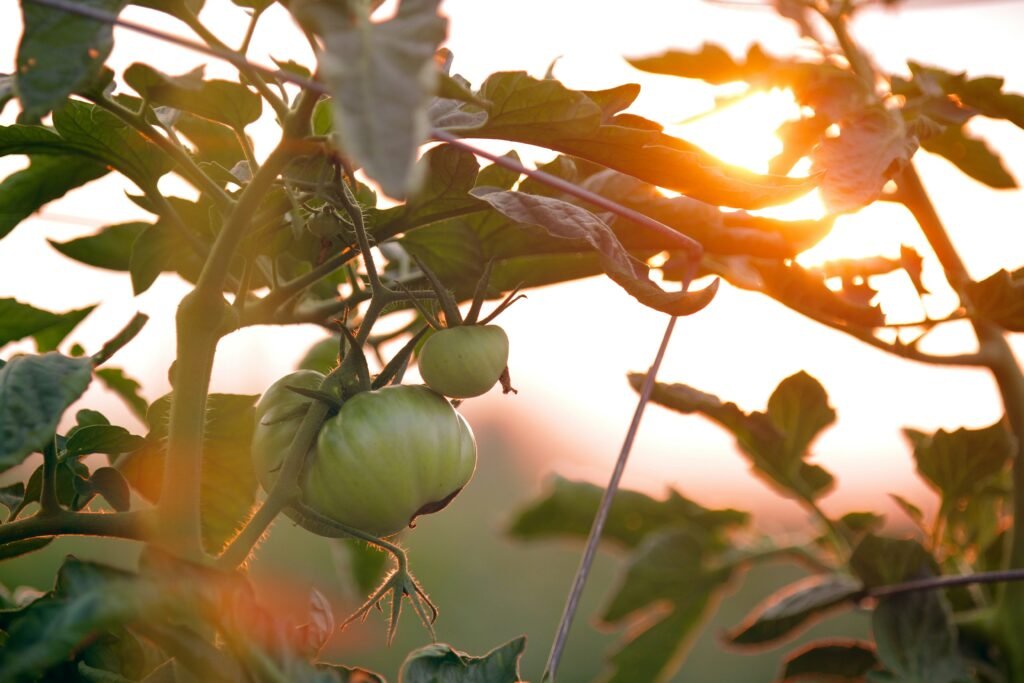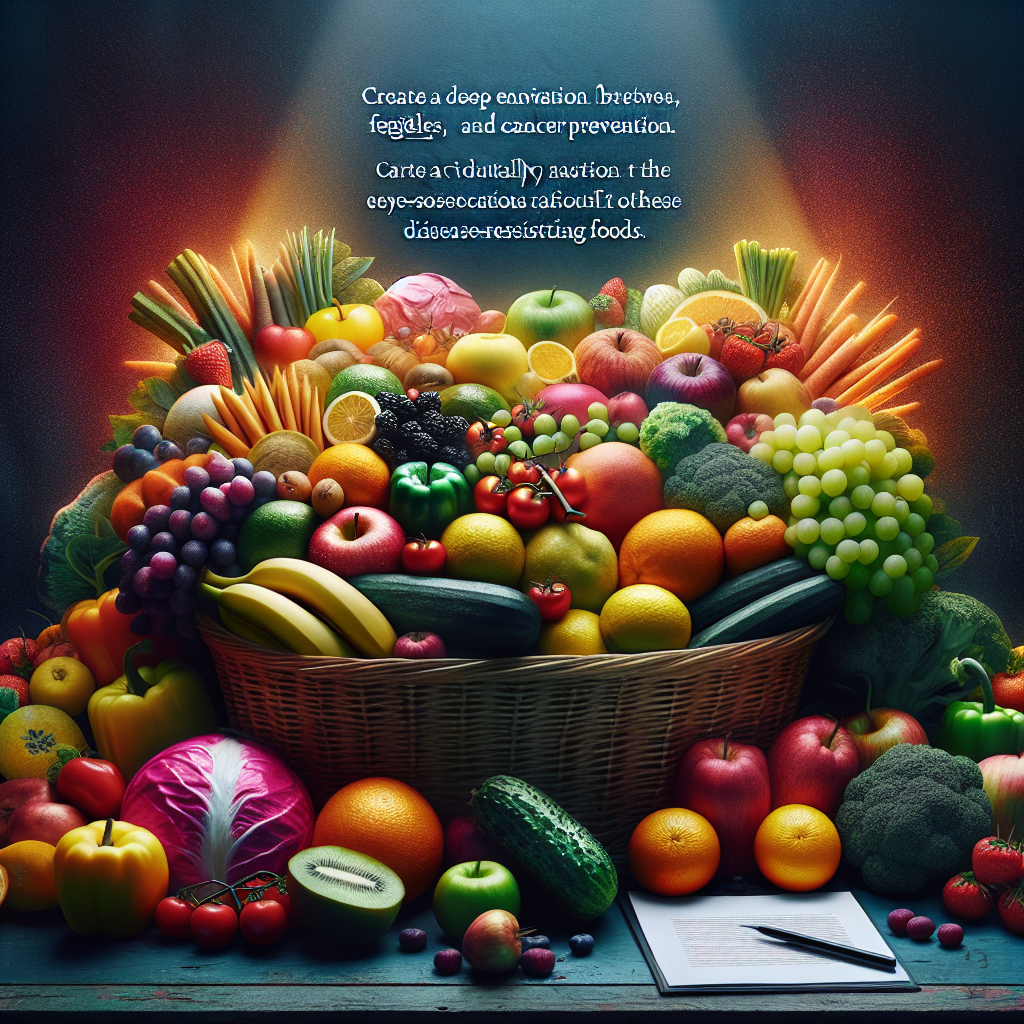It’s no secret that we all want to live long, healthy lives. So what’s the secret to achieving this? Well, it turns out that one of the key ingredients for cancer prevention is right in front of us – Fruits and vegetables. Packed with essential vitamins, minerals and antioxidants, these natural powerhouses have been shown to play a crucial role in reducing the risk of cancer. In fact, studies have consistently shown that a diet rich in fruits and vegetables can have a profound impact on our overall health and well-being, offering protection against various types of cancer. So why not grab a colorful assortment of fruits and vegetables and give your body the defense it needs to fight against this formidable disease? Let’s explore the incredible impact that fruits and vegetables can have on cancer prevention and take a step towards a happier, healthier future.
Cancer Prevention through Diet
Overview of Cancer Prevention
Cancer prevention is a crucial aspect of maintaining overall health and well-being. While there is no surefire way to completely prevent cancer, research has shown that certain lifestyle choices, including diet, can play a significant role in reducing the risk of developing various types of cancer. By making conscious choices about the foods we consume, we can support our bodies in fighting off potential cancer cells and promoting overall wellness.
Role of Diet in Cancer Prevention
Diet plays a critical role in cancer prevention, as it directly affects our bodies’ internal environment and cellular health. Consuming a diet rich in fruits and vegetables, whole grains, lean proteins, and healthy fats can provide the necessary nutrients and compounds to support our bodies’ natural mechanisms for fighting cancerous cells. Fruits and vegetables, in particular, have been extensively studied for their potential cancer-preventive properties.
The Power of Fruits and Vegetables
Types of Fruits and Vegetables
Fruits and vegetables come in a wide variety of types, each with its own unique set of beneficial compounds. Some of the most commonly consumed types of fruits include Berries, citrus fruits, and pomegranates, while cruciferous vegetables, leafy greens, tomatoes, garlic, onions, and mushrooms are popular choices among vegetables.
Nutritional Content of Fruits and Vegetables
Fruits and vegetables are packed with essential vitamins, minerals, and dietary fiber that support overall health. They are low in calories and fat, making them an ideal choice for maintaining a healthy weight. Additionally, fruits and vegetables provide a wide range of antioxidants and phytochemicals, which have been shown to have cancer-preventive effects.
Phytochemicals and Antioxidants in Fruits and Vegetables
Phytochemicals, also known as phytonutrients, are natural compounds found in plants that possess various health benefits. Many fruits and vegetables contain phytochemicals with antioxidant properties, which help protect our cells from damage caused by harmful free radicals. Some examples of phytochemicals found in fruits and vegetables include flavonoids, carotenoids, and polyphenols.

Specific Fruits and Vegetables in Cancer Prevention
Cruciferous Vegetables
Cruciferous vegetables, such as broccoli, cauliflower, kale, and Brussels sprouts, have been extensively studied for their potential cancer-preventive properties. They contain sulfur compounds, as well as glucosinolates, which are broken down into biologically active compounds that have been shown to inhibit the growth of cancer cells and promote their elimination from the body.
Citrus Fruits
Citrus fruits, such as oranges, lemons, and grapefruits, are rich in vitamin C and other antioxidants. These fruits have been found to have various anti-cancer properties. Vitamin C helps neutralize free radicals and enhances the body’s immune system, which plays a crucial role in identifying and destroying cancer cells.
Berries
Berries, such as Strawberries, blueberries, and raspberries, are not only delicious but also pack a powerful punch when it comes to cancer prevention. These vibrant fruits are rich in antioxidants, including anthocyanins and ellagic acid, which have been shown to have potent anti-inflammatory and anti-cancer effects.
Leafy Greens
Leafy greens, such as Spinach, kale, and Swiss chard, are nutritional powerhouses. They are loaded with vitamins, minerals, and fiber, and are low in calories. Leafy greens also contain various phytochemicals, such as lutein, zeaxanthin, and chlorophyll, which have been associated with a reduced risk of developing certain types of cancer.
Tomatoes
Tomatoes contain a compound called lycopene, which is a potent antioxidant. Numerous studies have shown that lycopene has anti-cancer properties, particularly in relation to prostate cancer. Cooking tomatoes actually enhances the release of lycopene, making tomato-based sauces and pastes excellent choices for incorporating this cancer-fighting fruit into your diet.
Garlic and Onions
Garlic and onions belong to the Allium family of vegetables and are widely recognized for their strong flavors. However, they are not just tasteful additions to dishes; they also possess cancer-preventive properties. Both garlic and onions contain organosulfur compounds, which have been shown to inhibit the growth of cancer cells and stimulate the body’s natural detoxification processes.
Grapes and Resveratrol
Grapes, especially red grapes, are a rich source of an antioxidant called resveratrol. Resveratrol has been studied for its potential in preventing various types of cancer, such as breast and colon cancer. It has been found to inhibit the growth of cancer cells and induce cell death, making it an exciting compound for cancer prevention research.
Pomegranates
Pomegranates have gained popularity in recent years due to their numerous health benefits, including cancer prevention. The seeds and juice of the pomegranate contain powerful antioxidants called ellagitannins, which have been shown to prevent the growth of cancer cells and inhibit the development of certain tumors.
Turmeric
Turmeric is a spice commonly used in Indian cuisine and is known for its vibrant yellow color. It contains a compound called curcumin, which has been extensively studied for its anti-inflammatory and anti-cancer properties. Curcumin has shown promising results in inhibiting the growth of cancer cells and preventing the spread of tumors.
Mushrooms
Various types of mushrooms, such as shiitake, maitake, and reishi, have long been used in traditional medicine for their health benefits. Mushrooms are rich in compounds called beta-glucans, which have been found to boost the immune system and activate cells that play a role in fighting cancer. Additionally, mushrooms contain polysaccharides and other bioactive compounds that have shown potential in inhibiting the growth of cancer cells.
Mechanisms of Action
Antioxidant Activity
Fruits and vegetables, with their abundance of antioxidants, help neutralize harmful free radicals in the body. Free radicals are unstable molecules that can damage our cells and DNA, potentially leading to cancer. By consuming a diet rich in fruits and vegetables, we provide our bodies with the necessary antioxidants to combat free radicals and maintain cellular health.
Anti-inflammatory Effects
Chronic inflammation has been linked to the development of various types of cancer. Many fruits and vegetables possess anti-inflammatory properties, helping to reduce inflammation in the body and potentially lower the risk of cancer. Phytochemicals found in fruits and vegetables, such as polyphenols and flavonoids, have demonstrated anti-inflammatory effects and may contribute to cancer prevention.
Immune System Support
A healthy immune system plays a crucial role in identifying and eliminating cancer cells before they can develop into tumors. Fruits and vegetables, especially those rich in vitamin C and other immune-boosting compounds, provide vital nutrients that help support our immune system’s function, thus aiding in cancer prevention.
Detoxification Support
Our bodies have natural detoxification processes that help eliminate potentially harmful substances. Certain fruits and vegetables, such as cruciferous vegetables and garlic, contain compounds that support our body’s detoxification pathways. By including these foods in our diet, we can enhance detoxification and help reduce the risk of cancer.
Anticancer Compounds
Many fruits and vegetables contain bioactive compounds that have been shown to specifically target and inhibit the growth of cancer cells. These compounds can interfere with various stages of cancer development, including cell division, angiogenesis (the formation of new blood vessels that feed tumors), and metastasis (the spread of cancer to distant areas of the body). The presence of these anticancer compounds in fruits and vegetables further underscores their potential in cancer prevention.

Epidemiological and Observational Studies
Population Studies on Fruit and Vegetable Intake
Epidemiological studies have consistently shown a positive association between high fruit and vegetable intake and a decreased risk of developing certain types of cancer. These studies look at populations over an extended period to assess the correlation between diet and cancer risk. The results consistently indicate a protective effect of fruits and vegetables against cancer, reinforcing the importance of including them in our daily diet.
Associations between Fruit and Vegetable Consumption and Cancer Risk
Specific types of fruits and vegetables have been linked to a decreased risk of developing certain types of cancer. For example, higher consumption of cruciferous vegetables has been associated with a lower risk of lung, colorectal, and breast cancers. Citrus fruits have been linked to a reduced risk of stomach and esophageal cancers. Berries have shown protective effects against various types of cancer, including colon, liver, and oral cancers.
Specific Cancer Types and Fruit/Vegetable Consumption
The impact of fruit and vegetable consumption on specific cancer types has been extensively studied. For instance, a higher intake of tomatoes and tomato-based products has consistently been associated with a reduced risk of prostate cancer. Meanwhile, cruciferous vegetables, such as broccoli and cauliflower, have shown potential in lowering the risk of bladder, lung, and colorectal cancers. These findings highlight the importance of incorporating a wide variety of fruits and vegetables into our diets for comprehensive cancer prevention.
Randomized Clinical Trials
Studies Investigating the Effects of Fruits and Vegetables on Cancer
Randomized clinical trials provide valuable insight into the direct effects of fruit and vegetable consumption on cancer prevention. These studies involve assigning participants to different groups: one group consumes a specified amount of fruits and vegetables, while the other group follows a control diet. These trials have shown promising results, demonstrating that increased fruit and vegetable intake can lead to favorable changes in biomarkers associated with cancer risk.
Intervention Trials with Fruit and Vegetable Supplementation
In addition to studying the impact of standard fruit and vegetable intake, researchers have conducted intervention trials by supplementing participants’ diets with concentrated forms of fruits and vegetables. These trials have shown that supplementation with specific fruits and vegetables, such as tomato extract or broccoli sprout extract, can induce beneficial changes in biomarkers related to cancer prevention. This further supports the role of fruits and vegetables in reducing cancer risk.

Recommended Intake and Dietary Guidelines
General Fruit and Vegetable Recommendations
To reap the cancer-preventive benefits of fruits and vegetables, it is recommended to consume a variety of them on a daily basis. The American Cancer Society recommends aiming for at least 2.5 cups of vegetables and fruits combined each day. This can be achieved by including a colorful assortment of fruits and vegetables in meals and snacks throughout the day, ensuring a diverse range of nutrients and bioactive compounds.
Dietary Guidelines for Cancer Prevention
Numerous organizations, including the World Cancer Research Fund and the American Institute for Cancer Research, have developed dietary guidelines specifically designed to reduce the risk of developing cancer. These guidelines generally emphasize the importance of consuming a predominantly plant-based diet, rich in fruits, vegetables, whole grains, lean proteins, and healthy fats. By following these guidelines, individuals can optimize their dietary choices and minimize their cancer risk.
Overcoming Barriers to Fruit and Vegetable Consumption
Accessibility and Affordability
One of the challenges in increasing fruit and vegetable consumption is ensuring their accessibility and affordability for all individuals. Efforts should be made to provide affordable and convenient options, such as farmers’ markets, community gardens, and mobile produce markets, especially in underserved areas. Additionally, education on budget-friendly ways to incorporate fruits and vegetables into meals can help overcome financial barriers.
Education and Awareness
Educating individuals about the health benefits of fruits and vegetables is crucial in promoting their consumption. This can be achieved through public health campaigns, school programs, and community events that focus on the importance of a plant-based diet for cancer prevention. Increasing awareness of the specific types of fruits and vegetables associated with reduced cancer risk can further encourage their inclusion in daily meals.
Taste and Culinary Approaches
Enhancing the taste and culinary appeal of fruits and vegetables can make them more enticing for individuals who may be hesitant to incorporate them into their diet. Experimentation with different cooking techniques, spices, and flavor profiles can help individuals discover new ways to enjoy fruits and vegetables. Cooking classes and recipe exchanges can also provide practical guidance on how to prepare delicious, plant-based meals.
Food Marketing and Availability
Marketing strategies that promote fruits and vegetables can have a significant impact on consumer choices. Increasing the visibility and attractiveness of fruits and vegetables in grocery stores, restaurants, and other food outlets can encourage individuals to select these items more often. Collaborations between health organizations and food retailers can help ensure the availability of a wide variety of fresh fruits and vegetables in all communities.
Personal Preferences
Individual preferences for certain fruits and vegetables can vary widely. Encouraging individuals to explore different options and find fruits and vegetables they enjoy can help overcome personal barriers to consumption. Promoting the inclusion of fruits and vegetables in favorite dishes, such as smoothies, salads, and stir-fries, can make them more appealing and enjoyable for individuals with specific taste preferences.

Additional Considerations
Organic vs. Conventional
Many individuals wonder whether choosing organic fruits and vegetables is necessary for cancer prevention. While organic produce may have some benefits, such as reduced pesticide exposure, current evidence suggests that the overall health benefits of consuming a variety of fruits and vegetables, regardless of their organic status, outweigh any potential risks. Therefore, it is recommended to prioritize the consumption of a diverse range of fruits and vegetables, regardless of their organic or conventional nature.
Processed Fruits and Vegetables
Processed fruits and vegetables, such as canned or frozen products, can still contribute to a healthy diet. However, it is important to read labels and choose products that are minimally processed and do not contain added sugars, salt, or artificial additives. Fresh, whole fruits and vegetables are still the preferred choice, as they retain their full nutritional value and are free from any additional ingredients.
Supplements vs. Whole Foods
While supplements may seem like a convenient way to obtain the beneficial compounds found in fruits and vegetables, they are not a substitute for whole foods. Whole fruits and vegetables provide a complex combination of nutrients and bioactive compounds that work synergistically to promote health. It is always best to consume a varied diet rich in fruits and vegetables rather than relying solely on supplements.
Conclusion
In conclusion, the impact of fruits and vegetables on cancer prevention cannot be overstated. Their abundance of antioxidants, phytochemicals, and other bioactive compounds provides crucial support for our body’s natural defense mechanisms against cancerous cells. Epidemiological studies, clinical trials, and dietary guidelines all emphasize the importance of incorporating a wide variety of fruits and vegetables into our daily diet. By overcoming barriers to their consumption and making conscious choices about our dietary habits, we can harness the power of fruits and vegetables to reduce our risk of developing cancer and promote our overall health and well-being.


